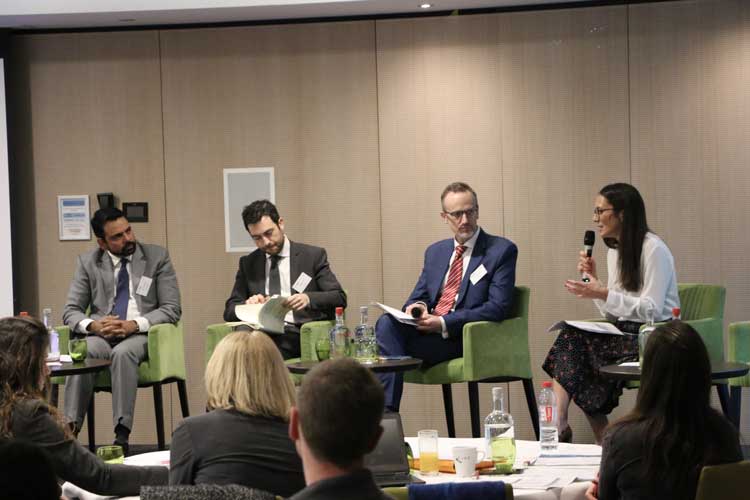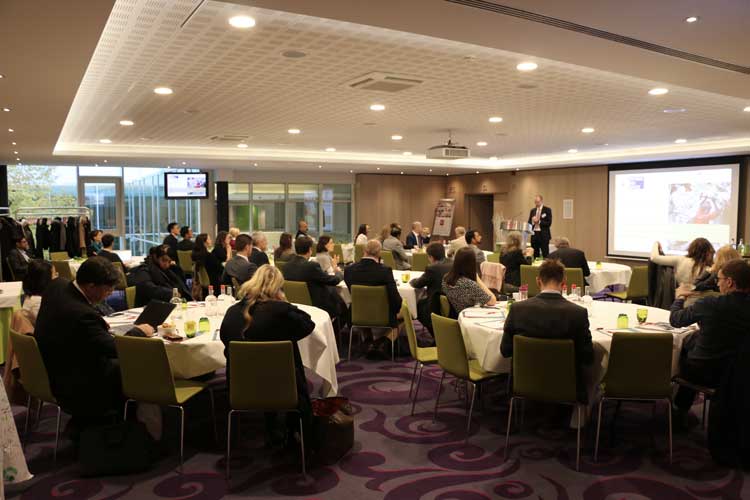More than 60 RMI members and stakeholders met in Brussels, Belgium November 19, 2019 to attend RMI’s 2019 Annual Conference. The event reiterated the focus of RMI’s mission to eliminate child labor and improve working conditions in the mica supply chain originating in the Indian states of Bihar and Jharkhand. Guest speakers shared insights on the legal framework required for the mica sector and discussed best practices in other extractive sectors such as cobalt and 3TG minerals. Strategies for 2020 were also discussed and endorsed.
2018 Highlights
After RMI president, Nils Oldenburg, welcomed participants, Fanny Frémont, RMI Executive Director, recapped some of RMI’s 2019 achievements.
- 80 villages receive now additional education, health, nutrition and social services as a result of RMI’s work, a 50% increase in village participation compared to 2018.
- More than 30,000 people who live in participating villages – some 5,800 households – now have the means to improve their standard of living with training and support to develop sources of income in addition to mica.
- Three mica processing facilities have completed a pilot implementation of RMI Workplace Standards, resulting in development of all guiding documents and training curricula for management and staff required to scale-up the program at other processors.
- RMI’s multi-stakeholder approach has built a team of 8 NGOs, one technical partner and 157 dedicated professionals located in villages.
- Membership in RMI has grown to 55 organizations that account for more than 55 percent by volume of mica exported from India.
Expert Panel on Mica Ecosystem
The effectiveness of RMI’s programs relies on an in depth understanding of the legal, commercial and social environment where mica is mined and processed and where its workforce resides. To broaden that understanding a three-person panel discussed interrelated aspects of the mica sector and similar small-scale mining ecosystems.
- Mr. Amrit Singh Deo, MD Strategic Communications at FTI Consulting, presented findings of a study commissioned by RMI that examined the legal framework for the mica sector in Bihar and Jharkhand. The analysis will provide the basis for stakeholders, including local governments, to discuss an effective regulatory framework in the sector.
- Dr. Benjamin Katz, Policy Advisor, Extractives, Centre for Responsible Business Conduct at the OECD discussed the importance of and how to formalize and apply due diligence measures for safeguarding small-scale, artisanal mining based on experiences in other countries and minerals.
- Mr. Thomas Wissing, Head of Advocacy and Partnerships Unit, Fundamental Principals and Rights at Work Branch at the ILO discussed the importance of due diligence and transparency, highlighting steps from ratification of ILO Conventions to effective implementation and providing examples outside the mica supply chain.
At the conclusion of the panel Mr. Sergio Piazzardi, representing the European Commission’s Directorate-General for International Cooperation and Development, recalled the history of the Commission’s involvement in establishing responsible supply chains, referring specifically to the EU Conflict Minerals Regulation on 3TGs, which will apply across the EU on 1 January 2021. He emphasized that private sector engagement was key to its success and that the Commission was promoting RMI’s approach.
Learnings and Upcoming Challenges
One of the benefits of RMI Annual Conferences that comes from both the formal and informal interactions among participants is the ability to evaluate and improve on-going program strategies. The 2019 Annual Conference revealed three important insights.
- To ensure a responsible mica supply chain and the eradication of child labor requires a deep modification of an entire ecosystem. While RMI’s strategy has been predicated on a holistic, three program pillar approach, that approach was validated by and confirmed as a necessity by guest speakers and participants alike.
- RMI’s capacity to monitor program progress and efficiency should be continually enhanced using dedicated experts and assessment tools. The effectiveness of those tools can be amplified by leveraging the expertise of all stakeholders who can monitor and ensure all actions are being implemented optimally on the ground.
- While acknowledging its success, RMI must continue to capitalize on its experience and achievements to date in order to expand its network of stakeholders and explore ways to share and apply its innovative approach in other countries or to address other minerals.
Strengthen · Accelerate · Enlarge
Fanny Frémont, RMI Executive director, concluded the Annual Conference by highlighting the three key directives that will help guide RMI’s strategy towards accomplishing its 2022 goal of establishing a responsible and sustainable mica supply chain without child labor in Bihar and Jharkhand.
- Strengthen RMI’s multi-stakeholder approach by developing dedicated monitoring and evaluation tools;
- Accelerate RMI’s programs by introducing them in more villages, increasing the number of training sessions and ramping up multi-stakeholder platforms;
- Expand RMI’s impact by welcoming new members and developing additional partnerships.

